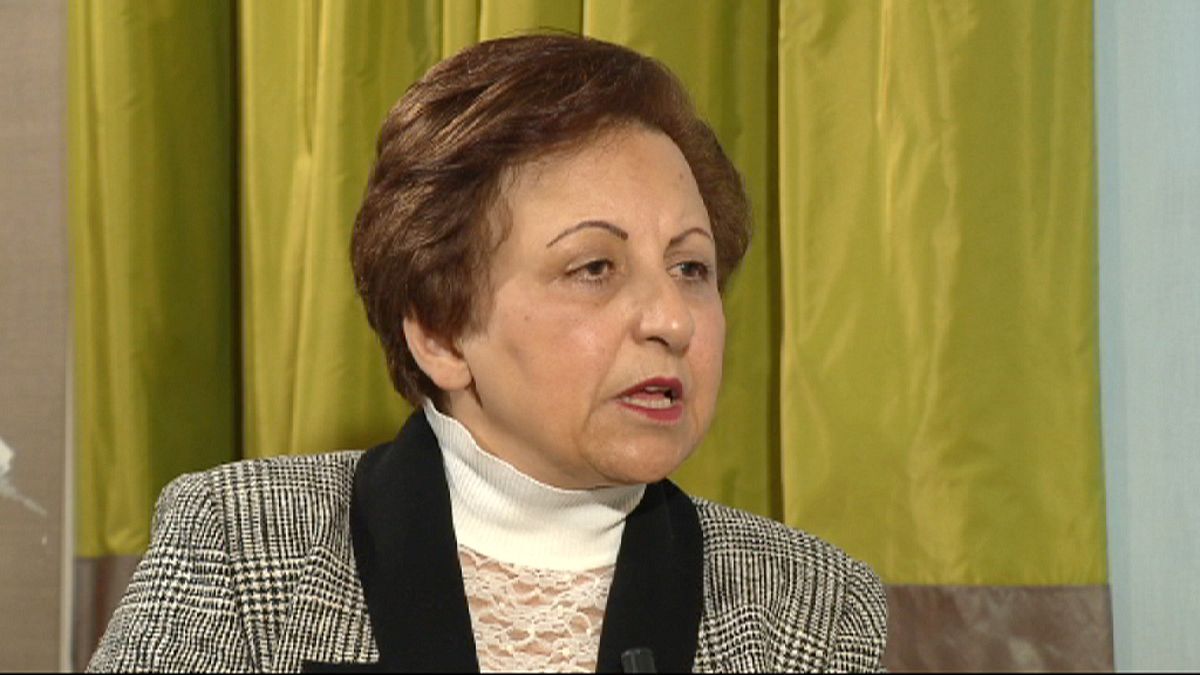On behalf of Ms Nasrin Sotoudeh, an Iranian lawyer currently in prison, Nobel peace laureate Shirin Ebadi has accepted this year’s Sakharov Prize for freedom of thought. The prize was jointly awarded to Iranian film director, Jafar Panahi. We asked Ebadi about human rights in Iran.
Hossein Alavi euronews:
“What message will the awarding of the European Parliament’s Sakharov Prize to Nasrin Sotoudeh and Jafar Panahi give, and what impact might it have for Iran?”
Shirin Ebadi:
“The message is that the world is aware of the peaceful struggle of the people towards achieving democracy and respect for human rights. Also important is that it shows the world how individual and political freedoms in Iran are restricted. This is to the extent that a famous film director who has been planning to make a film was arrested and sentenced to a long term in prison before even finishing the film and even before screening.
“Also, Ms Nasrin Sotoudeh, a lawyer, is sentenced to six years in prison and banned from practising law for 20 years. This shows what is going on in Iran.”
euronews:
“In the past, you have emphasized that the West should pay attention to human rights in Iran and the safety of its people, as well as to its nuclear programme. What, specifically, do you expect from the European Union?”
Ebadi:
“The European Union should extend the list of the individuals it has subjected to sanctions due to human rights violations. It should also go for sanctions that do not harm the people but rather aim at weakening the regime. My clear proposal is that the Iranian government should not be able to misuse European television satellites to spread hatred and lies. Also, EU representatives should go to Iran for the upcoming elections there, to supervise.”
euronews:
“Last month, the death of Iranian blogger Sattar Beheshti while under interrogation in prison, was perceived by Iranians and world public opinion as a blatant case of a human rights violation. At some stage, even the judiciary took an interest. But it seems that this is being attributed to a simple case of error by a government official. How can the Iranian judiciary be held accountable?”
Ebadi:
“The most important problem is that Iran’s judiciary system has lost its independence. It has turned into a department of the Intelligence Ministry. Unfortunately, security officials can dictate whatever they wish. The judges in charge of such cases just sign and enforce the orders. It is important that we retrieve the independence of the judiciary system and this is not possible unless its legal structure is completely changed.”
euronews:
“The mission of the UN special rapporteur on human rights in Iran Ahmed Shaheed is still unclear. Iranian officials have not yet allowed him to visit Iran. What measures can the UN take?”
Ebadi:
“The United Nations has understood well that the Iranian government’s intentions are to cover things up, and that is why it is not giving Mr Shaheed a visa. Take, for example, the type of elections that are held in Iran. The Iranian authorities pretend they are free elections.
“Representatives should go and oversee the upcoming elections and see if the presidential elections follow the guidelines of free, healthy and fair elections or not. The Iranian government is a signatory of the guidelines approved by the Inter-parliamentary union. These envoys should see if the elections are compatible with human rights conventions which Iran has also signed.”
euronews:
“In Iran’s prisons there are journalists, lawyers and human rights activists: Mrs Sotoudeh, Abdolfattah Soltani, Ahmad Zeidabadi, Issa Saharkhiz and Mohammad-Seddigh Kaboudvand. But there are also dozens of other political prisoners whose names are unknown. According to human rights activists, they and their families are under great pressure. What measures are activists and international communities taking regarding this group of prisoners?”
Ebadi:
“We should repeat the names of these people and they should be supported everywhere and in every way possible. For example, awarding them prizes can bring them into the limelight. One of these unknown people who is in the worst condition is Mr Javeed Houtan-Kian, the lawyer of Sakineh Mohammadi, the woman who was sentenced to death by stoning and whose stoning verdict has not been enforced, following international pressure.
“But her main lawyer, Mr Javeed Houtan-Kian has been sentenced to six years in prison. He has been in jail in the city of Tabriz for more than two years and he has been under the most severe physical and psychological pressures. This brave lawyer needs to be supported.”
euronews:
“A considerable number of individuals were executed in Iran this year – and this is according to the Islamic Republic of Iran’s official reports. Human rights activists have been expressing concern over drug accusations, and fear that some political dissidents might have been executed. Are the United Nations Human Rights Council and other international fora aware of this concern?”
Ebadi:
“Unfortunately, no announcement is made for many of those who are executed. The question remains whether they are drug smugglers or if there have been dissidents among them. We protest against such executions. Our strongest protest is that the judiciary holds trials for them behind closed doors.
“Specifically, two months ago, news came from the medical examiner that four women had been stoned and their bodies was seen by the coroners. When were they stoned? How were they tried? How can such punishments be enforceable in the 21st century? These are questions that Iranian lawyers are asking, for which, unfortunately, the regime has no answer.”
